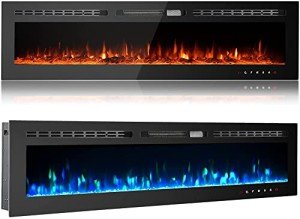The Best Fireplaces: A Comprehensive Guide for Homeowners
Fireplaces have long been a cherished function in homes, offering both warmth and a welcoming environment. They are available in various styles, sizes, and fuel types, permitting property owners to select one that fits their personal aesthetic and heating requirements. This article dives into the best fireplaces, highlighting crucial features and factors to consider to assist you make an informed decision.
Kinds of Fireplaces
Understanding the different types of fireplaces is crucial in choosing the very best option for your home. Below are the most commonly utilized fireplaces:
Wood-Burning Fireplaces
- Benefits: Traditional appeal, natural atmosphere, and efficient heating.
- Downsides: Requires routine maintenance, ash disposal, and undergoes local regulations relating to emissions.
Gas Fireplaces
- Advantages: Convenient, clean-burning, and simple to run.
- Disadvantages: Requires a gas line, can be more costly to set up at first.
Electric Fireplaces
- Advantages: Easy setup, low maintenance, and the best choice for homes with children or family pets.
- Downsides: Lack the genuine feel of wood or gas flames, might not warm large areas effectively.
Pellet Stoves
- Advantages: Eco-friendly, effective, and offer a stable heat output.
- Disadvantages: Requires electrical energy to run, and pellet supply can be restricted in some locations.
Ethanol Fireplaces
- Benefits: No chimney required, portable, and eco-friendly.
- Disadvantages: Generally less efficient for heating.
A Comparison of Fireplace Types
| Type | Installation Cost | Running Cost | Heat Output | Maintenance | Ecological Impact |
|---|---|---|---|---|---|
| Wood-Burning | ₤ ₤ | ₤ | High | High | Moderate |
| Gas | ₤ ₤ ₤ | ₤ ₤ | Medium-High | Low | Moderate |
| Electric | ₤ | ₤ ₤ | Low | Very Low | Low |
| Pellet | ₤ ₤ | ₤ | Medium | Medium | Low |
| Ethanol | ₤ ₤ | ₤ ₤ ₤ | Low | Extremely Low | Very Low |
Leading Considerations When Choosing a Fireplace
When you're in the marketplace for a brand-new fireplace, keep the following consider mind to ensure you pick the very best one for your home:
- Purpose and Functionality: What do you want your fireplace to do? Is it for heating or aesthetic appeals? This will guide your choice considerably.
- Space Availability: Measure the location where you desire to set up the fireplace. Make sure the picked type fits without frustrating the area.
- Fuel Source: Assess the schedule and cost of different fuel sources in your location to prevent unanticipated expenses.
- Installation Complexity: Some fireplaces may require considerable modifications to your existing home structure.
- Building Regulations and Regulations: Be mindful of local laws concerning ventilation, safety, and emissions, as these can affect your fireplace option.
- Visual Appeal: The design and style of a fireplace can act as a focal point or complement the existing decor, so select one that enhances your home's general aesthetic.
Benefits of a Fireplace
Including a fireplace to your home affords numerous benefits:
- Enhanced Aesthetic Appeal: A fireplace can raise the decoration of any room, creating a cozy and welcoming atmosphere.
- Increased Home Value: A well-installed fireplace can add significant worth to your home, making it appealing to prospective purchasers.
- Energy Efficiency: Modern fireplaces, particularly gas and pellet stoves, can supply effective heating while decreasing energy costs.
- Emergency Situation Heat Source: In cases of power blackouts, a wood or gas fireplace can act as a trusted heat source.
- Social Gathering Space: Fireplaces often become the focal point for events, promoting warmth and convenience during family or good friends' parties.
Frequently Asked Questions (FAQs)
Q: How much does it cost to install a fireplace?A: Installation costs can differ significantly based upon the kind of fireplace, structural requirements, and labor expenses. Basic electric fireplaces may cost around ₤ 300, while custom-made wood or gas fireplaces can run from ₤ 3,000 to upwards of ₤ 10,000. fireplacesandstoves.uk : Are electric fireplaces safe?A: Yes, electric
fireplaces are generally safe.
They do not emit carbon monoxide gas and have no open flames. They often consist of safety features like automated shut-off systems. Q: How typically need to I have my chimney cleaned?A: If you utilize a wood-burning fireplace, it's recommended to have your chimney cleaned a minimum of when a year
to prevent creosote accumulation, which can lead to chimney fires. Q: Can I set up a gas fireplace myself?A: It's not suggested to set up a gas fireplace without expert assistance due to the complexities related to gas
lines, ventilation, and safety regulations. Q: What are the best kinds of fuel for wood-burning fireplaces?A: The best fuel choices include well-seasoned woods like oak, maple, or hickory, as they burn hotter and cleaner compared to softwoods. Choosing the best fireplace for your home
includes thinking about numerous factors, from looks to operate and security. Each type of fireplace has its unique advantages and potential drawbacks.
Understanding these elements, in addition to your personal heating needs and budget plan constraints, will assist you in making a notified decision. Ultimately, a fireplace can provide not only heat however also a rich atmosphere, changing your home into a welcoming sanctuary.

